Physical Address
304 North Cardinal St.
Dorchester Center, MA 02124
Physical Address
304 North Cardinal St.
Dorchester Center, MA 02124

The Best and Latest in Conservative Thought

Russell Kirk (1918-1994) was a prominent American political theorist, historian, and writer, widely recognized as one of the founding fathers of modern American conservatism. His seminal work, The Conservative Mind (1953), played a crucial role in shaping the post-World War II conservative movement by tracing the intellectual lineage of conservatism from Edmund Burke to the twentieth century. Kirk’s writings emphasized the importance of tradition, moral order, and prudence, advocating for a society rooted in established customs and values.
Beyond The Conservative Mind, Kirk authored numerous books and essays that delved into political philosophy, cultural criticism, and education. He was a frequent contributor to conservative publications and a sought-after speaker, influencing a generation of conservative thinkers and policymakers. Kirk’s philosophy was grounded in the belief that true conservatism is not an ideology but a way of living that values order, justice, and freedom. His work continues to inspire and guide the conservative movement, making him a towering figure in the intellectual history of American conservatism.
The Conservative Mind
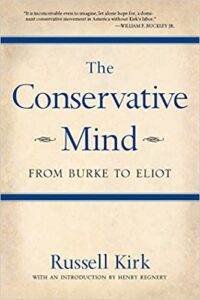
Russell Kirk’s The Conservative Mind is a foundational work in twentieth-century American conservatism. Brilliantly conceived and featuring a carefully curated selection of key figures in the history of intellectual conservatism, the book played a pivotal role in launching the modern American Conservative Movement when it was published in 1953. It has since become a timeless classic in political thought.
The seventh revised edition includes the complete text, accompanied by a new introduction from publisher Henry Regnery.
An essential read for anyone interested in conservative philosophy.
Russell Kirk’s Concise Guide to Conservatism
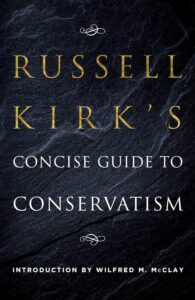
The modern conservative intellectual movement began in 1953 with Russell Kirk’s groundbreaking book The Conservative Mind. Four years later, he published a concise, philosophical summary of conservatism, originally titled The Intelligent Woman’s Guide to Conservatism. This little book served as a more accessible version of The Conservative Mind.
Now, a century after Kirk’s birth, this overlooked gem has been revived. It remains what Kirk intended: an accessible introduction to conservative ideas, especially for the young. With a new title and an introduction by esteemed intellectual historian Wilfred M. McClay, Russell Kirk’s Concise Guide to Conservatism arrives at a critical moment. The conservative movement that Kirk defined in 1953 is now so contested and fragmented that its core meaning is often unclear.
As fresh and prophetic as it was sixty years ago, this book is a reminder that no one can engage people’s minds and imaginations like Russell Kirk—an indispensable task in the effort to revive our civilization.
The Roots of American Order
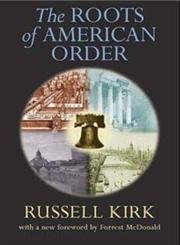
What holds America together? In this classic work, Russell Kirk identifies the beliefs and institutions that have nurtured the American soul and commonwealth. Kirk’s analytical narrative traces the sources of American order, beginning with the Hebrew prophets and moving through what he calls a “tale of five cities”: Jerusalem, Athens, Rome, London, and Philadelphia.
For those seeking to understand America’s significance in the twenty-first century, Russell Kirk’s masterpiece on the history of American civilization remains unparalleled.
The American Cause

The American Cause articulates in simple yet eloquent language the fundamental principles underlying America’s experiment in constitutional self-government. Russell Kirk, whose life and thought have been prominently featured in C-SPAN’s acclaimed American Writers series, intended this book to assert the moral and social principles that uphold our nation. Kirk’s primer encourages reflection on the political, economic, and religious principles that have united Americans in the face of challenges and threats to ordered freedom.
In this new age of terrorism, Kirk’s clear and direct presentation of the core tenets of American belief is both necessary and welcome. Gleaves Whitney’s newly edited version, along with his insightful commentary, makes The American Cause a timely and essential addition to the literature of liberty.
Edmund Burke: A Genius Reconsidered
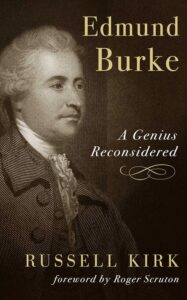
In this lively and accessible one-volume biography of Edmund Burke, Russell Kirk masterfully weaves together Burke’s private and public lives. Offering a fresh assessment of the great statesman, Kirk reveals that Burke’s influence is even more significant today than it was in his own time.
As a leading figure in the post-World War II revival of American interest in Edmund Burke, Russell Kirk emphasizes the enduring relevance of Burke’s ideas. According to Kirk, “Burke’s ideas interest anyone nowadays, including men bitterly dissenting from his conclusions. If conservatives would know what they defend, Burke is their touchstone; and if radicals wish to test the temper of their opposition, they should turn to Burke.”
Kirk elucidates Burke’s philosophy, demonstrating how it manifested in concrete historical situations during the eighteenth century and how it “speaks to our age.” The volume vividly portrays the four great struggles of Burke’s public life: his efforts to reconcile England with the American colonies, his campaign to curtail the domestic power of George III, his prosecution of Warren Hastings, the Governor General of India, and his resistance to the Jacobinism of the French Revolution.
In each of these significant phases, Burke fought with passionate eloquence and relentless logic for justice and the proper balance of order and freedom. With his deep sympathy and understanding, Kirk provides incisive quotations, illuminating highlights, and moving human elements that bring Burke and his era to life. Through Kirk’s skillful portrayal, Edmund Burke emerges as a contemporary figure whose voice still resonates in our own troubled times. “Because corruption and fanaticism assail our era as sorely as they did Burke’s time, the resonance of Burke’s voice still is heard amidst the howl of our winds of abstract doctrine.”
The Politics of Prudence
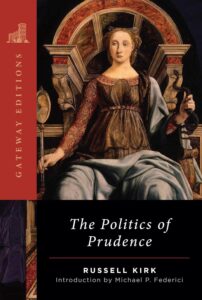
Conservatives are guided by prudence, a principle emphasized by Russell Kirk (1918–1994), one of the founding fathers of American conservatism. In a time when the tradition of prudential politics is challenged, its revival may well begin with the wisdom found in this insightful book. Prudence, understood as practical wisdom and the capacity to choose the right means to achieve worthy ends, is a virtue crucial for statesmanship.
In this work, Kirk distinguishes political prudence from ideology, exploring ten principles, events, books, and thinkers that have shaped the conservative mind and heart. The final chapter addresses the shortcomings of democracy worldwide and underscores the need for representative government led by temperate and thoughtful individuals. An eloquent epilogue calls upon the rising generation to defend both moral and social order against the enemies of justice, freedom, and high culture.
Drawing on decades of learning and practical experience, this lucid book is Kirk’s bequest to the young men and women of today—an instruction manual for redeeming the time.